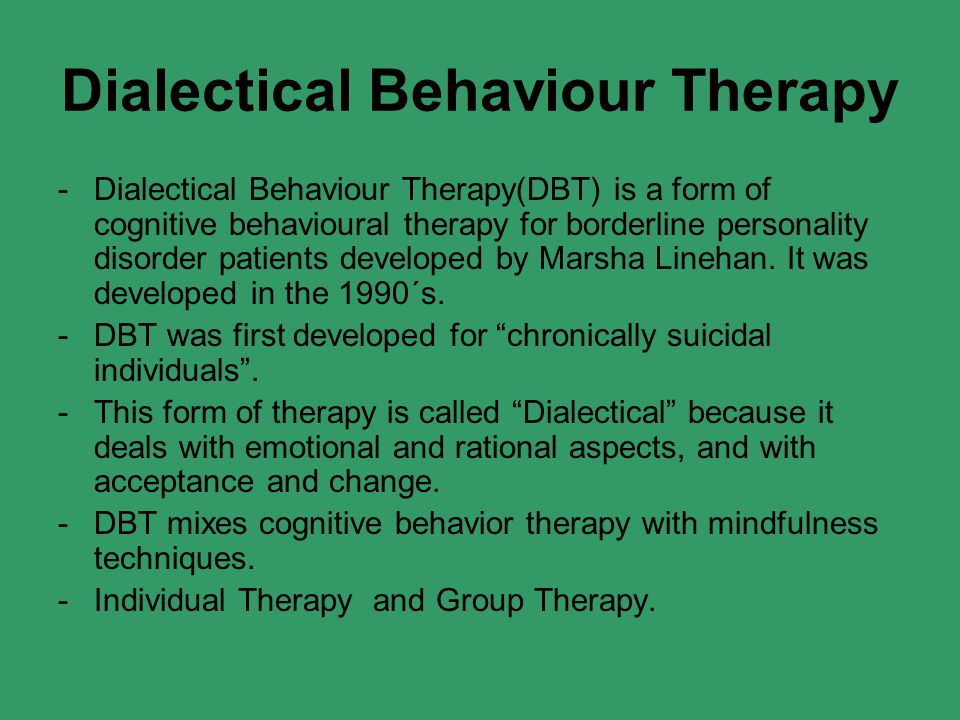Experience Growth and Revival with DBT London's Competence
Experience Growth and Revival with DBT London's Competence
Blog Article
Empowering Individuals With Efficient Dialectical Practices Treatment (DBT) Services: Building Stronger Mental Health Foundations
In the world of psychological health and wellness and well-being, the significance of encouraging people through effective Dialectical Practices Therapy (DBT) services can not be overemphasized. By focusing on the core principles of DBT, such as boosting emotional policy skills, boosting interpersonal performance, developing distress tolerance strategies, and cultivating mindfulness techniques, individuals can embark on a trip towards structure stronger psychological health structures.
Comprehending the Core Concepts of DBT


One core principle of DBT is recognition. Therapists utilizing DBT recognize the client's sensations and behaviors as legitimate responses to their atmosphere. This recognition helps build a solid restorative partnership and encourages individuals to function towards modification. An additional fundamental element is dialectics, which educates individuals to check out scenarios from multiple point of views and locate the synthesis between conflicting thoughts or feelings.
Additionally, the idea of dialectical abstaining is main to DBT. This concept urges individuals to abstain from self-destructive habits while additionally approving themselves. By understanding and incorporating these core principles, specialists can successfully apply DBT methods and support people in their trip in the direction of psychological law and psychological well-being.
Enhancing Psychological Law Skills
Establishing efficiency in taking care of emotions is a fundamental facet of cultivating emotional health and social performance - DBT London. Enhancing psychological guideline abilities is a core element of Dialectical Behavior Therapy (DBT) that equips individuals with the devices to browse extreme emotions in a healthy and constructive way. With DBT, individuals learn to recognize, recognize, and control their emotions, resulting in improved psychological wellness results
DBT emphasizes the importance of mindfulness, which entails existing in the moment without judgment. This practice permits people to observe their emotions without becoming bewildered by them, improving their ability to react successfully as opposed to react impulsively. By growing mindfulness, individuals can develop a better sense of self-awareness and psychological control.
In addition, DBT shows useful abilities such as distress resistance and emotion regulation strategies to assist people handle difficult emotions. By finding out these abilities, individuals can reduce spontaneous actions, enhance decision-making, and enhance their connections with others. Ultimately, improving emotional law skills through DBT equips individuals to lead even more fulfilling and balanced lives.

Improving Interpersonal Efficiency
Having actually established a strong structure in psychological regulation abilities within the structure of Dialectical Practices Treatment (DBT), the emphasis currently shifts in the direction of improving interpersonal performance. Improving social performance is an essential component of DBT as it gears up individuals with the necessary abilities to browse social communications, interact efficiently, set boundaries, and construct much healthier connections.
In DBT, interpersonal effectiveness abilities are educated with modules that concentrate on locations such as assertiveness, reliable communication, and interpersonal analytic. By finding out these skills, individuals can boost their capability to express their needs and needs, maintain self-esteem, and click this link build more powerful links with others.
Practicing mindfulness is an essential component of enhancing social efficiency within the DBT structure. Mindfulness permits individuals to be existing in their interactions, pay attention actively, and respond attentively instead of respond impulsively. By incorporating mindfulness right into their day-to-day lives, individuals can grow greater self-awareness and psychological regulation, which are necessary for successful interpersonal communications.
Building Distress Tolerance Strategies
Exploring efficient approaches for managing psychological distress is essential for individuals looking for to boost their coping skills and durability. Structure distress resistance methods is a crucial aspect of Dialectical Behaviour Therapy (DBT) that encourages people to browse tough feelings without coming to be overloaded.
Additionally, mindfulness techniques play a substantial function in building distress tolerance. Mindfulness encourages individuals to remain existing in the minute without judgment, enabling them to observe their thoughts and emotions without responding impulsively. This recognition makes it possible for people to tolerate distress much more efficiently and develop a greater feeling of control over their feedbacks.
In enhancement to these methods, producing a customized distress tolerance strategy with the advice of an experienced specialist can offer individuals with a customized strategy to handling emotional distress - DBT London. By including these approaches into daily life, people can reinforce their mental health structures and improve their overall health

Cultivating Mindfulness Practices
To deepen their distress tolerance methods better, individuals can focus on cultivating mindfulness methods as a complementary method within the structure of Dialectical Practices Treatment (DBT) Mindfulness, a key component of DBT, involves paying interest to today minute without judgment. By promoting mindfulness, people can boost their recognition of ideas, emotions, and bodily feelings, promoting a deeper image source understanding of themselves and their experiences.
Mindfulness methods in DBT consist of strategies such as mindful breathing, body scans, and observing ideas without add-on. These practices motivate individuals to develop a non-reactive position in the direction of their inner experiences, enabling them to reply to tough circumstances with greater clarity and calmness. By including mindfulness right into everyday routines, individuals can learn to manage their feelings a lot more properly, lower spontaneous habits, and cultivate a feeling of internal peace.
Through growing mindfulness techniques, individuals going through DBT can build a solid structure for handling stress, improving partnerships, and improving overall well-being. By incorporating mindfulness right into their therapeutic trip, people can establish important skills that encourage them to browse life's challenges with strength and self-awareness.
Final Thought
Finally, effective Dialectical Practices Therapy (DBT) solutions play a critical function in empowering people to build more powerful mental wellness structures. By understanding the core concepts of DBT, enhancing psychological policy abilities, enhancing interpersonal efficiency, building distress resistance techniques, and growing mindfulness practices, people are equipped with the needed tools to browse their emotions, connections, and challenges in a much more flexible and durable way. DBT services More Bonuses use a comprehensive strategy to promoting mental health and empowering people to lead fulfilling lives.
By concentrating on the core principles of DBT, such as improving psychological policy abilities, enhancing interpersonal performance, building distress tolerance methods, and growing mindfulness practices, individuals can begin on a trip in the direction of structure stronger mental wellness foundations. Enhancing emotional guideline skills is a core element of Dialectical Behavior Treatment (DBT) that equips individuals with the tools to navigate extreme feelings in a healthy and balanced and constructive way.In addition, DBT teaches useful skills such as distress resistance and feeling guideline strategies to help individuals manage difficult emotions.To strengthen their distress tolerance methods additionally, people can concentrate on growing mindfulness techniques as a corresponding strategy within the structure of Dialectical Practices Treatment (DBT) By understanding the core principles of DBT, enhancing emotional regulation skills, improving interpersonal effectiveness, building distress resistance strategies, and growing mindfulness methods, individuals are geared up with the required tools to navigate their feelings, partnerships, and difficulties in a much more adaptive and resilient way.
Report this page